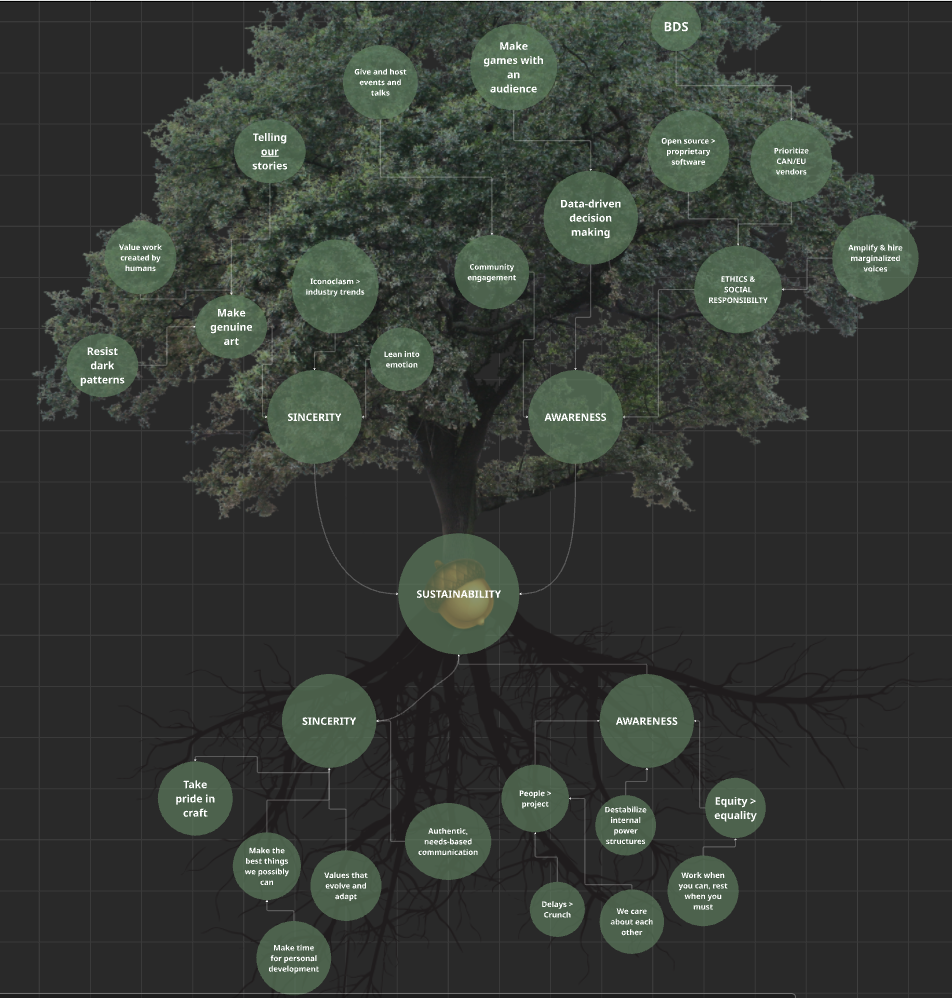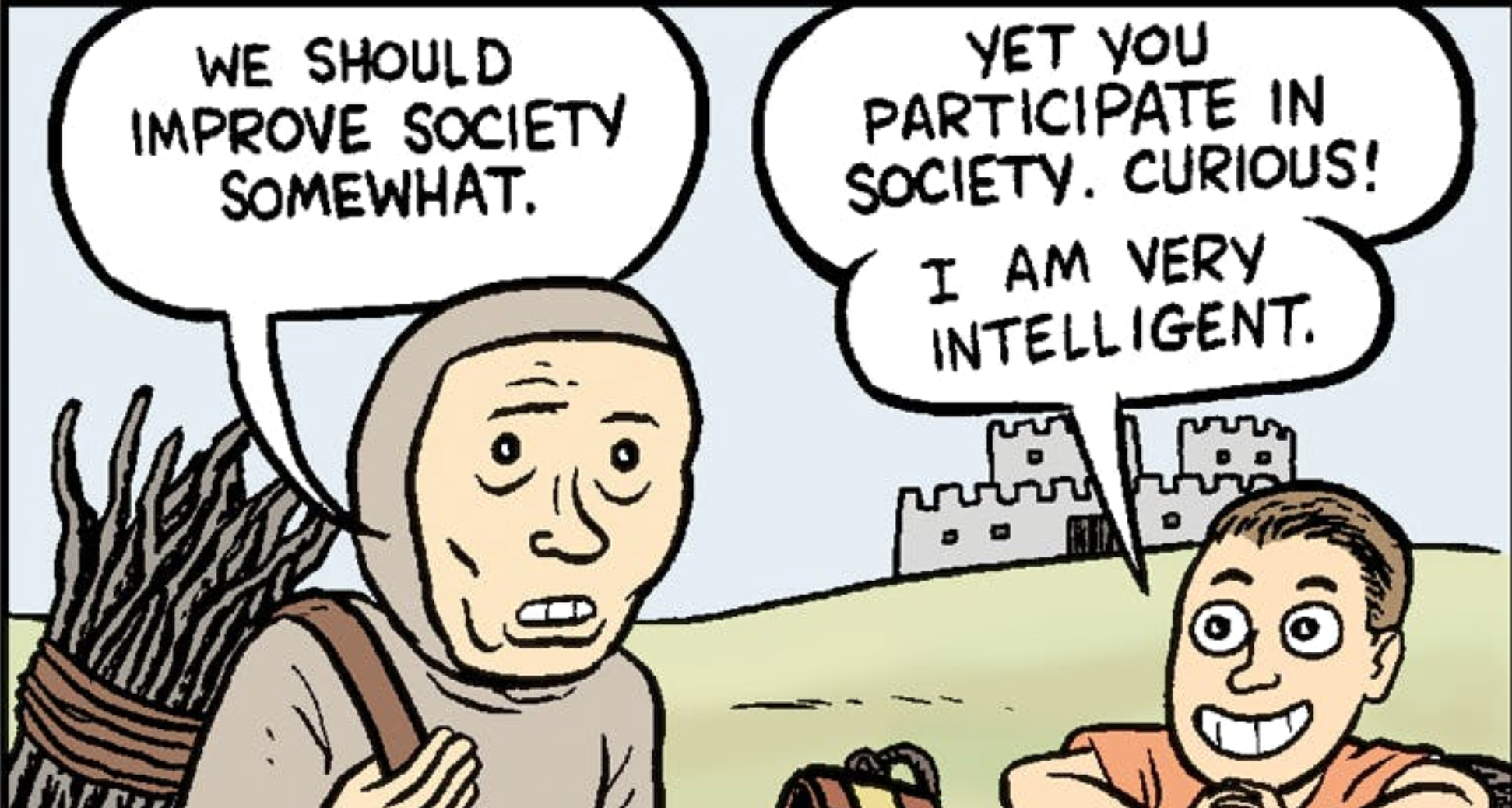Living our (studio) values
Companies have values. Studios are companies and thus studios have values.
They at least say they have values, they state them. But it’s pretty hard to tell if they actually live them or believe in them.
As part of the Baby Ghost program we’ve been thinking about company values a lot. Because I like to process my thoughts by writing, I’m going to do some brain dumping about how we’ve approached the exercises, what values we’ve landed on, and how to make our values explicit through our actions.
Finding our values as a studio - first draft
I like to start all my homework with a bit of research. So when given the assignment of brainstorming our values I first searched for lists of other company values.
All the places I’ve worked have had values, very few of those places took them seriously. So starting this assignment feels a bit like “choose the values you’ll eventually fail to live up to”. But that’s not approaching the assignment in good faith or with optimism. There’s nothing wrong with planning for success.
A piece of advice we got was to “go wild” with our values, even if they seem weird or difficult or extreme.
But it was still a struggle to think about “what values should our studio be built on”, probably because I don’t often think of my actions as “what is an action that serves this value”.
What eventually clicked and helped make the exercise easier was remembering that I’m a person of pretty strong values and that the studio could also be a thing of strong values.
I have a lot of ethical choices I make in life that sacrifice convenience because to me it’s The Right Thing To Do. Hell, in our wedding vows I wrote “I promise to keep striving with you to live a better life, to live by our morals…”. Which helped frame studio values as “things that aren’t easy but are important”. Which eventually helped to lead us to our tree of values:

Top 3
It feels like most companies choose a few key values that they eventually put on a website. Our assignment sheet also started with room for 3 so we ran with that lol.
- Sustainability
- Sincerity
- Awareness
I’ll elaborate more on these another time or on our website. Whichever comes first. What I wanted to focus on today was how our values shape our actions, or really, how our already existing actions helped shape our value choices.
Actions that support our values
Awareness is the value I wanted to highlight today. We break awareness down into a few more granular things to specifically be aware of:
- Our ethics & social responsibility
- Community engagement
- Data-driven decision making (being aware of markets, trends, what consumers are interested in)
Ethics & social responsibility is probably the largest sub-group and one that strongly shapes the foundation of the studio early. For us a big part of this means avoiding Big Silicon Valley tech and US companies as much as we can.
We’ve both worked for tech companies of varying degrees of evil over the last 10 years. In the last year the US has basically threatened to invade our country. Big Tech spends a lot of money on US elections. Big Tech also supports on-going wars and genocides. Big Tech absolutely wants to take advantage of your attention, your data, and your money. There’s a lot of reasons to try to avoid them.
This is not convenient (we spend a lot of time looking for alternative tools and paying money for tools that could otherwise be free (at the cost of your data)) but it is important to us.
Alternatives
These aren’t exclusively game or studio alternatives to tools but they are alternatives to exploitative tools. They can be hard to find and evaluate so I wanted to make a list in case anyone else is looking to make some switches.
Music
The alternatives to Spotify are growing! It’s a good time to switch! We ended up going with Qobuz. It has apps for Apple and Android, lets you buy content through the app and has actual music journalism going on within the app. Write ups and reviews by people who know music.
Analytics
I recently added analytics to my blog because I’ve started sharing it beyond my little circle of friends. I haven’t tracked anything beforehand and I was curious if there was something simple I could do to just track page views. And there was!
This alternative to Google Analytics popped up very quickly on a search: Simple Analytics. Based in Europe they’re following the bigger privacy focused laws like GDPR. They also have a nice free tier which will fit my needs for many years. Basically I’m just getting the number of page views, number of unique visitors, and which country they’re from. While it’s very minimal, most blocking extensions will still stop this data collection. I use Ghostery on one browser so I don’t even track my own visits there lol. We’ll eventually add Simple Analytics to our studio website.
Search engines
Tired of the constant enshitification of Google, we are paying users of Kagi.
Newsletters
This one took a lot of investigation. Mostly because I was hoping to find an alternative to Substack which is more precise than just “newsletters”. Newsletters are tricky because by law you need to include an address (often a business address). We aren’t comfortable putting our home address out into the internet like that. Substack gets around this by letting users default to using the Substack address.
To get around putting our personal address on newsletters we’ll eventually pay for a business address or PO box to avoid doxing ourselves. And once that’s done we’ll likely go with Cakemail as they’re an established Canadian service.
Docs
Probably the fastest growing Google alternative. Proton offers mail, calendar, docs, and more. I’m someone who’s lived in the Google ecosystem for decades now. Mostly because it’s the only tool I use. I don’t need anything fancy, I just want web based documents. So now I’m early into my Proton evaluation to see if it can fully replace Google as my go-to.
Project management
We don’t require much for project management or brainstorming right now. We both keep paper to-do lists and just do the work that needs to be done. We don’t have task tracking because every few hours we’re showing each other our progress. The to-do list for programming is implementing the pages of game rules we have. The only tracking we currently have is my festivals/opporunities list of things to apply to.
We’ve kept things very simple and will be trying to keep things simple for as long as we can. If there's one thing I've learned from Knowledge Management school it's to be very careful with your tools and practices, the tools you use will shape how you approach work. They'll also make it harder to change due to classics like sunk cost fallacy.
I’ve already set a standard for being a journaling minimalist through my 1-page per year journaling method I call microjournaling. This while also blogging every few weeks for over 2 years... The real key to documentation is being able to tell what's important, an absolutely herculean task. But when it comes you how you work, you can learn what's important to you and build from there. Which is how I ended up with my tiny journaling method. A way for me to set priorities while avoiding feeling overwhelmed. Possibly some big changes ahead for me as I consider adding another page just for studio and game things!
Over time we'll figure out what's important for collaboration and for how we make games. Brining on a 3rd person will absolutely revolutionize our approach as we learn what works for them. Eventually, and also hopefully, we’ll one day grow to needing something else to manage projects, and for that we’re looking at Zenhub to stay closely linked to GitHub. Our main point of collaboration.
Conclusion
There of course will always be this:

There are lots of things we won’t find good alternatives to. We’re going to keep using GitHub, we’re going to post on social media sites because that’s where the people are, etc, etc. But in the places where we can find alternatives that keep us working we’ll continue to prioritize them. We’re still early into our studio and everything is still baby steps for us. But we want it to be baby steps in the right direction.
If anyone has non-American tool recommendations that you’re really happy with, I’d love to hear about them!
